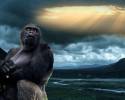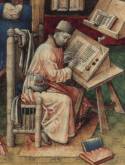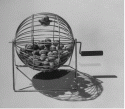Book Review - God- or Gorilla?, Introduction & Chapter 1
This entry is part of a series. For a bit of an introduction and an index of all entries in the series, go here.
 I said that I'd do a post a week in this series, but I don't think that introduction counts as much of a post. So today, I'm also going to post the first real review entry, which will cover the introduction and Chapter 1 - Making the Piltdown Man.
I said that I'd do a post a week in this series, but I don't think that introduction counts as much of a post. So today, I'm also going to post the first real review entry, which will cover the introduction and Chapter 1 - Making the Piltdown Man.
Introduction
Right off in the introduction, McCann gives us a taste of the longest running falsehood in creationism, implying that evolution had already peaked and was on its way out of the scientific establishment.
Reaching its climax in 1921, the ape-man hoax took the form of a seemingly spontaneous movement to reestablish the theory of man's monkey-origin. (McCann, vii)
It's been nearly 9 decades since McCann penned this book, and I think we can see how well the various theories of evolution are doing.
We also get an admission right up front that he was going to quote mine (though I don't think it was known by that term back in the '20s).
Many scientific men will be angry of course, but as they, themselves ared oing [sic, jrl] the talking and as they, themselves, are quoted by chapter, verse and page, they cannot be angry, except with themselves. (McCann, ix)
Of course, anyone who's followed creationism is aware that this a common tactic of creationists today (for example, see my entry, Ray Comfort - Quote Miner Extraordinaire). This shows that it has a long history.
Chapter 1
McCann really seemed to have it in for Henry Fairfield Osborn. In the opening line of the opening chapter, "Making the Piltdown Man," McCann mentioned him by name.
In four glass cases in the Hall of the Age of Man, American Museum of Natural History, New York City, Professor Henry Fairfield Osborn exhibits "evidence" of man's ape origin.
McCann went on to criticize Osborn throughout the book. Admittedly, the Wikipedia entry for Osborn quotes The American Historical Review, describing Osborn as "a first-rate science administrator and a third-rate scientist." But McCann focused on Osborn so much that many sections of the book became more of a personal attack on Osborn rather than a criticism of evolution, in general. Anyway, I didn't want to get into too much detail on this, but the personal vendetta against Osborn was very obvious and worth mentioning.
McCann didn't seem to like conditional statements:
...(note the persistence of that if, if,if, even though no sense of shame accompanies it)... (McCann, 12)
and just a little later on the same page:
In spite of all the evidence to the contrary, they start all over again, fresh and undismayed, with a new premise of if, if, if, and immediately in the same sentence the conclusion drawn from the "if" shoots itself like a projectile from a gun, "This discovery is most valuable!!!" (McCann, 12)
What's wrong with conditional statements? That's just how deductive reasoning works. You lay out your premises, and if all those premises are true, then the conclusion follows. Maybe we're just more used to these types of statements in the age of computers, thanks to all the If Then statements we use in programming. But deductive reasoning has been around for a long time.
In this specific example, though, McCann got the gist of Osborn's argument completely wrong. McCann went on to quote Osborn in the very next paragraph:
But it appears rather that we have here two types of man which lived in Chellean times...
In other words, Osborn was saying something to the effect of, 'If Boule's interpretation were right, it would be an incredible discovery, but it appears that his interpretation is wrong.'
Stay tuned for next week's review of Chapter 2 - The Trinil Ape-man.

 Today is
Today is  The other day talking to my daughter, she asked me about something I didn't know the answer to. So, I told her I was going to look it up on Wikipedia. She instantly told me I shouldn't do that, because you can't trust Wikipedia. Her teachers had told her so. So, after a little back and forth, I told her I'd give her some information she could take to her teachers to show them that Wikipedia wasn't so bad. What I wrote was largely recycling of a comment I left in the entry,
The other day talking to my daughter, she asked me about something I didn't know the answer to. So, I told her I was going to look it up on Wikipedia. She instantly told me I shouldn't do that, because you can't trust Wikipedia. Her teachers had told her so. So, after a little back and forth, I told her I'd give her some information she could take to her teachers to show them that Wikipedia wasn't so bad. What I wrote was largely recycling of a comment I left in the entry,  I wrestled back in middle school and high school. I was never great, but I wrestled varsity many of those years and won more matches than I lost*. My senior year, two girls decided to join the team. This was the first time it had ever happened at my high school. Before the season started, the rest of the team talked about it a bit. We wondered if it was appropriate to wrestle a girl, and whether or not they should be on the team. Well, as soon as practices started up, it just kind of fell into place. They were just two more wrestlers, and were treated just about like everybody else on the team (with the exception of using a different locker room and getting weighed in separately). It turned out to not be a big deal at all. One of the girls was pretty good for her first year. Obviously, they were wrestling JV, but this girl won a lot of her matches, and even pinned a couple of her opponents. This was all about 15 years ago.
I wrestled back in middle school and high school. I was never great, but I wrestled varsity many of those years and won more matches than I lost*. My senior year, two girls decided to join the team. This was the first time it had ever happened at my high school. Before the season started, the rest of the team talked about it a bit. We wondered if it was appropriate to wrestle a girl, and whether or not they should be on the team. Well, as soon as practices started up, it just kind of fell into place. They were just two more wrestlers, and were treated just about like everybody else on the team (with the exception of using a different locker room and getting weighed in separately). It turned out to not be a big deal at all. One of the girls was pretty good for her first year. Obviously, they were wrestling JV, but this girl won a lot of her matches, and even pinned a couple of her opponents. This was all about 15 years ago. I've gotten permission from
I've gotten permission from  I'm currently in the process of reading Hector Avalos's book,
I'm currently in the process of reading Hector Avalos's book,  I've
I've  This isn't the type of story I usually tell on this blog, but it was too good to pass up. It happened to a couple of friends of mine. I've changed the names of those involved, but everything else happened just like I've told it (or, as accurately as I comprehended and retold it).
This isn't the type of story I usually tell on this blog, but it was too good to pass up. It happened to a couple of friends of mine. I've changed the names of those involved, but everything else happened just like I've told it (or, as accurately as I comprehended and retold it). I've had my look through the server logs for the past month. Last month, I'd mentioned that it looked like my traffic had plateaued. Well, the total visits to my site increased roughly 10% since last month. Maybe my site has finally hit some critical mass, and it's getting forwarded and forwarded to all the countless masses who just can't wait to read my pearls of wisdom on evolution, politics, and religion. Or maybe the spammers are just getting more prolific (I had 524 junked comments in the past 24 hour).
I've had my look through the server logs for the past month. Last month, I'd mentioned that it looked like my traffic had plateaued. Well, the total visits to my site increased roughly 10% since last month. Maybe my site has finally hit some critical mass, and it's getting forwarded and forwarded to all the countless masses who just can't wait to read my pearls of wisdom on evolution, politics, and religion. Or maybe the spammers are just getting more prolific (I had 524 junked comments in the past 24 hour).